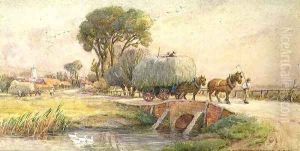Peter Watson Paintings
Peter Watson was an influential British art collector, benefactor, and a pivotal figure in the world of 20th-century art, although he was not an artist himself. Born on September 14, 1908, into wealth and privilege, Watson's impact on the art scene, particularly in Britain and France, was significant, owing much to his financial support and personal involvement in various artistic and literary projects. His background provided him with the means to become a notable patron of the arts, and throughout his life, he was deeply involved in supporting artists, galleries, and publications that shaped modern art's direction.
Watson's education and early interest in art and literature set the stage for his later contributions. He attended Eton College and studied at St John's College, Cambridge, where he further developed his passion for the arts. After Cambridge, he traveled extensively, which broadened his aesthetic sensibilities and understanding of contemporary art.
In the 1930s, Watson's influence grew as he became a benefactor to several artists and writers. He was instrumental in the founding of the influential art magazine 'Horizon' in 1939, along with Cyril Connolly and Stephen Spender, serving not only as a financial backer but also as an editorial advisor. 'Horizon' became a key platform for modern artists and writers in Britain, featuring works by both established and emerging figures.
Watson's patronage extended beyond publications. He was a significant supporter of the Contemporary Art Society and played a crucial role in the establishment of the Institute of Contemporary Arts (ICA) in London. Through these endeavours, he helped to promote and support modern art in Britain, making contemporary art more accessible to the public and encouraging the recognition of new talent.
His personal life was as complex and intriguing as his contributions to the art world. Watson lived openly as a homosexual at a time when it was illegal in Britain, and his social circle included many of the leading artistic and literary figures of the day. Unfortunately, his life was cut short under mysterious circumstances; he was found dead in his bath in his Paris apartment in 1956, at the age of 47. Despite the mystery surrounding his death, Peter Watson's legacy as a patron of the arts remains undisputed, having played a vital role in the development and promotion of modern art in the 20th century. His influence is seen in the artists and projects he supported, many of which continue to be celebrated today.
